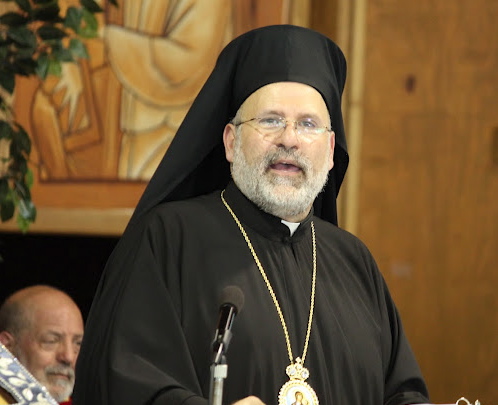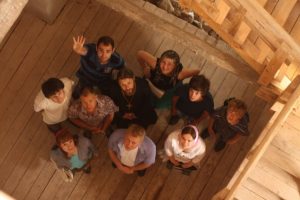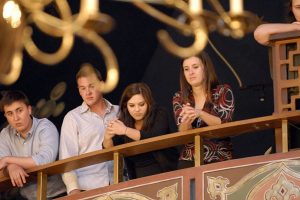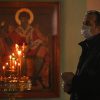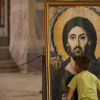When someone my age addresses a group of folks your age, you usually hear about how difficult your generation has it: too much technology, too much information, too much change; technology is to be your cross. In return, some of your generation find it difficult to imagine how dinosaurs like me have been able to survive without instant information and constant communication. In some ways, we belong to different worlds, and dinosaurs ought not try to break into an age that has passed them by. For example, each of my three children, independently of each other, told me my smart phone was way too sophisticated for me and that I couldn’t learn how to use it. I was proud that I went to the phone store to pick it out by myself! Little did I know how to deal with something that came without instructions. Intuitive, they said at the store. It is user-friendly and you don’t need instructions. Intuitive for someone of a different world!
All this is to say that folks of my generation imagine your life to be more challenging and difficult than that of any generation before you. While some speakers will lament how difficult your lives are and will be, and your ministry to witness to a post-modern and post-Christian world is and will be, I stand before you with great hope and trust. I would go so far as to say, encouraged. I am impressed and blessed to be with you today. You warm my heart.
Franklin Delano Roosevelt said, “To some generations, much is given. Of other generations, much is expected.” To my generation much was given, of your generation much is required. The lukewarm Christianity of my generation will not cut it for you and your cohorts. Lukewarm will not hold a parish together today. You expect and demand integrity and seriousness. Like God, your generation will spew the lukewarm out of your mouths. You want Christian leaders who live the life, follow the way, and know God. You will not settle with knowing about what the ancients said; you want and seek a relationship with God that comes out of encountering Him. Your parents’ generation wanted to know about God, and that did not really sustain them. You want to know God and you can, and you do.
We encounter God as we encounter each other through our senses. Through our senses we see, hear, touch and smell. Through conversations we correct our perceptions and better understand each other. Through this work, and such work takes time and deliberate effort, we come to know each other. To know God, we come together and assemble as the Church which God established, and within which He lives. Here we challenge each other and share God with each other. We learn how God acts in the lives of those who hear His voice. We learn to pray; to talk and listen to God. We also learn from other Christians in Church how to live in Christian families. We learn how to maintain Christian relationships and how to discern God’s own action. We learn how to love and how to forgive.
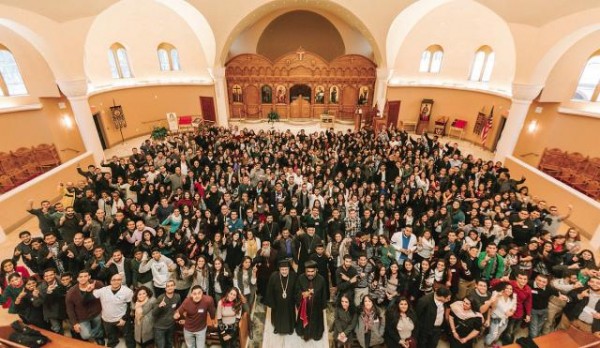
Bishop John addressed the 2014 One Conference, a Pan-Orthodox Youth Gathering in New Jersey, on November 29, 2014.
Everyone grows up in a family that has its own challenges and history. That history determines how that family works. When a man and woman come together in marriage, a unique combination of traits and customs merge to create a unique family with unique challenges. It is impossible for such a family to work, without some major learning of each other’s use of language and developed customs. Miscommunications are inevitable. To survive, we need to be open to learn, to be patient with each other, and to forgive. We need to learn to forgive as Christ forgives. Christians sharing strategies in communicating and problem-solving in Christian ways are essential in meeting new challenges in changing times. Marriage is a community event, because the whole Christian community is needed to support us as we live in an ever-changing world. Christian marriages, partnerships with Christ in the center, express the sharing of God-given life and bear witness to the Kingdom of God. They require more than the fallen world has to offer. Christian marriages require relationships with God and people in which we deliberately seek God’s will.
Of course, this is not to say that one needs to be married to be Christian. I do not accept the idea of some who teach that the only modes of Christian living are marriages or monasteries. We have a need to love as God loves, a need to sacrifice as God sacrificed, and a need to obey as Christ obeys, but I say that Christians in Church communities, no matter their state, can love, sacrifice and obey. Unmarried people not in monasteries can and do love God and His people. They do love, sacrifice, and obey God, as He reveals Himself through our Christian relationships and our Christian vocations. Such life, however, requires that we organize our local Church communities in such a way as to meet the needs of this time and place. Our parishes need to be more than fund-raising organizations that provide Sunday worship to God’s people. They need to be places where men and women work together with their clergy to encounter God and live within Him. As the parishes transition and change to meet the needs and challenges of our people, we need to be prophets. We need to be patient, loving servants who are instruments of change. Prophets know God’s will and witness to it. We need to work for the change and share our God-given prophetic vision honestly and lovingly. This transition will take a long time, but it is not all or nothing. As we work for this transition, we will be fed, our faith strengthened and our needs met.
Those with visions are blessed or cursed with pictures of how things could, would and should be. These pictures are called expectations. We adults are challenged to adjust our expectation of how we will feel or should feel in an ever-changing world. Our expectations, created in childhood, are dreams that now may sabotage our success, as reality rarely resembles visions. Other Orthodox Christians, sharing their walk with God and their feelings and interactions, help us adjust our expectations and navigate in our walk with God. I recall the episode of Leave It to Beaver in which Wally went to high school. I learned how it should feel to be grown up enough to go from junior high school for the big league. Imagine: with an AARP card in my pocket, I am still not feeling old enough to go to high school. I need other Christians to give me an idea of what is “normal” in my experiences, and to help me understand what is just craziness taught by Hollywood, and what is real. So, too, other Christians can help me understand what the ascetic life looks and feels like in this time, and what reasonable and unreasonable expectations are. My idea of what it is like to be happy as an adult, derived from my perception of these things as a young child watching TV shows, needs to be corrected. The reality shows of this age are just as unrealistic as the sitcoms of my time. Without Christ and without other Christians, I am destined to be a slave of my childish and unreal expectations. The result is dissatisfaction and despair. To be real, I need Christ and I need you. I need to read the Scriptures, spend time with Church fathers old and new, and commune with you.
To encounter God we gather to worship. Mankind is created to worship. We humans naturally develop rituals and constantly feel the need to stretch forth towards something or someone. If we are not worshiping God, we are worshiping the flesh, passions, government, organizations, causes or intellect. Some of these are obvious, while others are so subtle they are difficult to discern. Notice, however, all the ritual of sporting events, public gatherings, gym protocols and restaurant dining. We are creatures of ritual! Within these rituals we are able to commune with each other and corporately experience something greater than ourselves. When we gather as Church, God is our source and destiny. When we gather for sports or politics, our focus is something other than God. When our priorities are right, there is room for many other things, but when they replace God, we lose our very purpose for being.
Some imagine that we need a revolution. We need to overthrow our lukewarm local parish councils and pastors and replace them with energetic, idealistic youth. (I acknowledge that I overstate things here.) Others will suggest that it is God who will lead the revolution and His ways are not always easy to discern. Some suggest that it is by way of persecution that God purges His Church and calls His children home to repentance. I am always reluctant to interpret current events as acts of God. God doesn’t check with me first before He acts or allows people to act. He has given everyone free will, and the cost of that free will is that people suffer the consequences of others’ actions. Nevertheless, it is arguable that since Constantine’s Edict of Milan, which decreed tolerance for Christianity in the fourth-century empire, persecution and intolerance of Christianity is currently at its highest level.
In America persecution is subtle, in the form of ridicule by some so-called intellectuals and the scheduling of youth events during worship times, but in other places, dominated by the so-called “religion of peace,” persecution takes the form of church burnings, desecrations, beheadings, crucifixions, ethnic purging, job discrimination, confiscation of homes and the like. Some of us have come to America, Australia and Europe to escape this kind of persecution. Many of us are frustrated that the West seems not to care very much about the persecution of Christians. Some scholars suggest that in the West we avoid complex issues. Democracy as majority rule, without basic, individual human rights and the protection of minority groups, confuses the principles of each, which we hold dear. Discussions of such issues don’t fit well in the presentation of the news in two-minute segments. Nonetheless, we Orthodox Christians have a duty to share the truth and call attention to the suffering of all innocent and persecuted people everywhere, including our own.
One of the priests of my diocese, a son of the 70s, has mobilized the parish he serves to stand in solidarity with suffering Christians in the Middle East. He voluntarily painted a nuun, the one-letter symbol persecutors use disparagingly for Christians, on the church. Nuun stands for Nasrani, the people of the Nazarene, Christ. When painted on a Church or building, the symbol is a warning for Christians to leave the area. He then took a picture of the nuun and made postcards that church members display on their cars and homes. He made t-shirts with the nuun that gets me funny looks at the gym, but also invites discussion. This is a concrete way in which we can join those suffering persecution, as is holding up our persecuted brothers and sisters in prayer, corporately and privately. Standing together before God in prayer allows us to stand as one.
All power belongs to God. God is the creator of all things, even that to which He gives free will. He is the orderer of the universe, and nothing exists without Him. Pilate claimed power to crucify Christ. Jesus answered in John 19, “Thou couldest have no power at all against me except it were given thee from above.” How could God give man power? He created man in His image and likeness and calls Him to share in His power as a priest or steward. Those to whom power is given will be judged on their stewardship or priesthood of that power. If your power is that of parent, judge or governor, your power is from above, and your judgment at the footstool of God will be about your stewardship.
We gather together today as Christians concerned with justice, truth and eternal life. We gather to support one another as we witness to the Truth who is Jesus, in the world and time in which God has placed us. We witness to a world which describes itself as post-Christian and post-modern, a system, it is claimed, with little respect or need for truths or God. How do we witness to the God we know in such a world? How do we stand firm in our convictions and faith? How can we live and prosper in such conditions?
The power of God belongs to Him. We are rescued by Christ. By incarnation God joins His power once again to our life, and allows us to share in His good action in the world. This sharing requires ascetic effort. We need to grow past ourselves and join the force and action of God. We shed ourselves of distractions and addictions, we shed ourselves of sin, and we deliberately hear the voice of God through Scripture, prayer, and Christian fellowship. Christian fellowship is more than enjoying pizza after bowling with other Christians. Christian fellowship is studying God’s action in the world together (this is also called Tradition), and encouraging each other tolive in purity. Fasting, prayer and good works help us ex- perience fellowship together. Gathering as the body of Christ and recognizing our head and source, Jesus Christ, is necessary.
Power is about tapping into the life and action of God who has all real power, and doing His will. It is about joining His action and feeding, clothing, visiting, nursing, comforting His people and being right with Him through praise. By praise, I don’t mean yelling “Glory!” but being in a relationship with God that reflects the relationship of a creator and His creation. God is more than buddy or parent. He is the lover of man who calls us into being and shares his glory and life. Our glory is a reflection back to Him of His own glory.
This is what we see in Acts 4:33: “With great power (God) gave the apostles witness of the resurrection of the Lord Jesus and great grace was upon them all.” God shares His power with us in the Church and calls us to join His priesthood and ministry. When asked about authority or power, the apostles said that the power is from God through Jesus Christ. So, too, is your power. Your power to act, and your power to serve, and your power to be triumphant over persecution, and even death! It is said that the forty holy martyrs of Sebaste sang wedding songs as they understood their martyrdom as a way of being wed to God. To this day, these holy martyrs are remembered at the wedding ceremony, as we see in the crowns, implying victory over sin and passion.
In Orthodoxy all truth is in balance and any truth out of balance is not truth. Professor Verhofskoy of St. Vladimir’s Seminary said that once you open your mouth you are bound for heresy. All arguments are to call an exaggeration into the middle, and to do so we use exaggerations! God is healthy and calls us to be healthy. By healthy, I mean in truth. which is in Christ who is truth. We are not all set aside to be clergy, but we are all to witness to Christ by doing whatever we do well, and through it recreating God’s orderliness and life. When people see our joy and our efforts in our everyday life, when they are ready they will ask us about our faith. It is then that our witness will be most effective, planted on what Christ in parables speaks of as fertile ground. We need to be worshiping well, studying hard and listening when we pray. We need to build up our relationships with God and each other. We need to make these things our priority. The Christian life is not “rocket science”; it is simple. To live simply, however, takes deliberate effort. That is, it must be done delierately and takes great time and energy.
I wish to close with a quote from Elizabeth Ann Seton, the first American-born, Roman Catholic canonized saint: “We must live simply that others may simply live.” To be true, this must be more than a call to social service; it is a call to sharing God’s power to witness to Christ, and in Christ, to a post-modern and post-Christian world.












